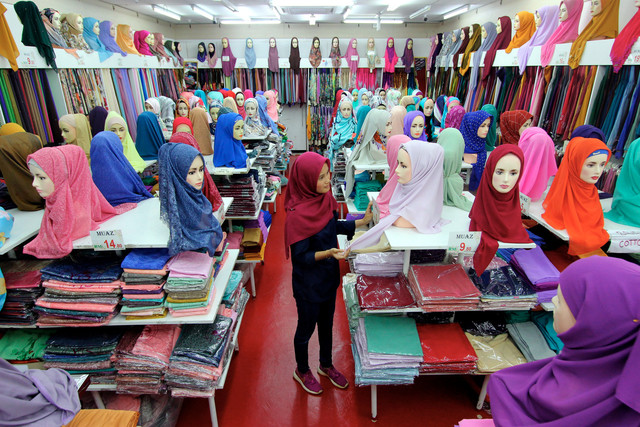
Woman eyeing scarf in clothing shop. Photo courtesy of Bernama
FRANKFURT, May 21 (NNN-Bernama) — Several German exhibitors at TechTextil 2019 here believe that Malaysia’s textile industry, seen by many as a “sunset industry”, has potential to reassert its position in the global markets.
This was shared by a number of German textile importers of home and technical textiles at the just-concluded four-day Techtextil/Texprocess, touted as the world’s largest combined trade fair for technical textiles and textile processing.
“As long as China continues to offer cheaper and low-end textiles, other countries with higher labour and production costs are finding it difficult to compete even though they produce better quality material.
“However, China’s production and labour costs have risen sharply over the years. The trade friction with the US has provoked a migration by some manufacturers out of China to countries such as Vietnam, Indonesia, Bangladesh and even Ethiopia.
“Malaysia, in the circumstances, can benefit from this development and asserts its position in the global markets, thanks to its better quality (material) despite slightly higher prices,” Helmut Gottzmann, a German indenting agent near Frankfurt told Bernama at the show.
But German companies are also aware of the limitations of the Malaysian textile industry which faces a shortage of skilled workers.
Though the fate of the labour-intensive textile industry depends on adequate well-trained workforce, the industry worldwide now seems to be reviving itself, including in many high-cost countries, thanks to “smart manufacturing” involving the deployment of robots and automation.
While robots will not completely replace humans, they do serve as a substitute in many areas of textile manufacturing.
Sascha Dehl, director of product and innovations at Veit GmbH, a Bavaria-based company which supplies “smart machines” for textile and garment, said his company, which provides various machines for the “ultimate in garment manufacturing” that displace manual work, has attracted garments manufacturers from several Asian, African and Latin American countries, as they cut production and labour costs.
Some of the features of the machines, Dehl pointed out provides maximum protection for workers, shielding them from heat transfer.
“Research and development (R&D) is key to our innovative capability and, in effect, to our success,” he said, adding that the company’s main R&D centre is in Landsberg but it also maintains a small R&D centre in Hayan, China.
Dehl said that among Veit’s major markets in Asia are Bangladesh, China, India, Indonesia, Malaysia and Vietnam.
“Given the uncertainties that presently characterise global trade, Malaysia can bounce back in textile manufacturing because of the superior quality of its products,” he said, adding that the shortage of workers can be replaced to a not insignificant level by automation which is a “key to our future survival”.
Dietrich Eickhoff, chairman of DA Group of Kaiserslautern that showcased a range of machines with a wide array of applications, said the company serves the entire value chain of the textile industry through its innovative machines, technology and digitalization.
He pointed out to his company’s latest product named “Delta” which is equipped with the Industry 4.0 features.
“Delta is not just a sewing machine… it is revolutionising the sewing process. Delta has the capability to communicate with the operator, making the latter more efficient.
“Such a system would be most appropriate for countries with labour shortage like Malaysia. Delta automatically connects and is designed to integrate the present and the future,” Eickhoff said, adding that Delta makes the difference and applies a step-by-step guide and is connected with future operations like other DA Group’s machines.
“Delta would be a perfect fit for Malaysia’s textile, automotive and aerospace industries. Malaysia and Indonesia are very important markets for us. Indeed, ASEAN is an opportunity, as well as a challenge for us,” Eickhoff said.
NNN-BERNAMA





